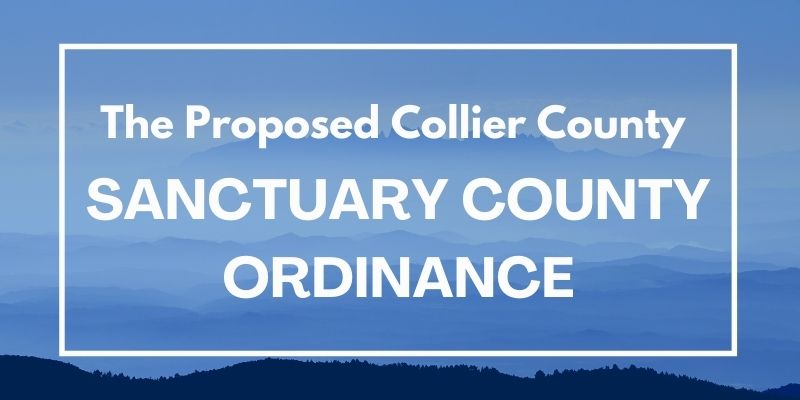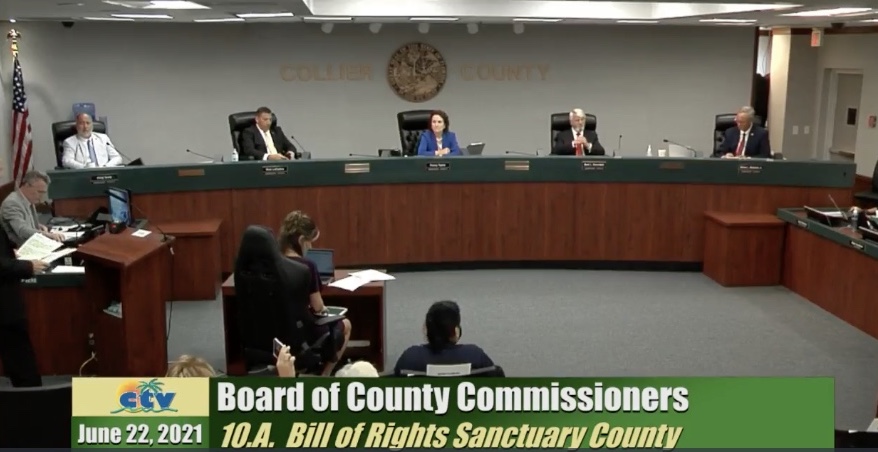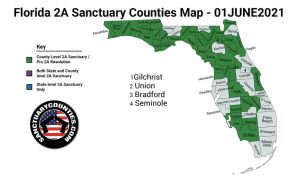
The Board of County Commissioners (BCC) will be voting Tuesday on a proposed ordinance to establish Collier County as “a Bill of Rights Sanctuary County.”
In this post, I will summarize the proposed ordinance, provide context within which to understand it both locally and more broadly, and summarize and provide links to statements and articles by both supporters and opponents.
I encourage you to let your elected representatives know your thoughts about this important matter so they will take them into consideration before they vote. I will let you know how you can do so at the end of this post.
The Proposed Ordinance
Download the proposed ordinance from the County website here
or read it on the Sparker’s Soapbox website here.
The ordinance begins with 13 introductory “whereas” paragraphs intended to explain why the ordinance is required.
- The first “whereas” says the BCC has “growing concerns over the federal government’s increasing encroachment on the rights and privileges of its citizens.”
- The second “whereas” says that “of particular concern [to the BCC] are those edicts being promulgated by the federal government in the form of executive orders, which circumvent the legislative process and arguably violate the fundamental American doctrine of separation of powers.”
- The next ten “whereas” paragraphs cite the U.S. Constitution, three U.S. Supreme Court decisions, and Florida statutes.
- The final “whereas” says the BCC “acknowledges and affirms that the Sheriff is an independent Constitutional officer and not under the authority of [the BCC, but that he] is charged with the duty to enforce County Ordinances.”
The next part of the ordinance provides a series of “Findings” primarily consisting of a recitation of the first ten amendments to the U.S. Constitution (the Bill of Rights). Following that is a statement that “Collier County has the right to be free from the commanding hand of the federal government and has the right to refuse to cooperate with federal government officials in response to unconstitutional federal government measures, and to proclaim a Bill of Rights Sanctuary for law-abiding citizens in its cities and County.”
Section 3 of the proposed ordinance defines “Unlawful Act” as “Any federal act, law, order, rule, or regulation, which violates or unreasonably restricts, impedes, or impinges upon an individual’s Constitutional rights…” and declares such “Unlawful Acts” to be “invalid in Collier County and shall not be recognized by Collier County, and shall be considered null, void and of no effect in Collier County, Florida.”
Section 4 of the proposed ordinance says that ”no agent, department, employee or official of Collier County” in their official capacity shall “participate in any way in the enforcement of any Unlawful Act” or use County resources to “engage in any activity that aids in the enforcement or investigation relating to an Unlawful Act.”
Section 5 says that anyone in Collier County accused of violating the ordinance may be sued in Circuit Court “for declaratory and injunctive relief, damages and attorneys’ fees,” and may also be subject under the General Penalty provision of the County Code to a fine of up to $500, imprisonment in county jail for up to 60 days, or both.
In Other Words…
- The proposed ordinance would nullify (invalidate) in Collier County any federal law that is deemed to be contrary to an individual’s constitutional rights.
- It would then make it a violation for any county employee to participate in carrying out such laws.
- If they did, they could be sued and punished with a fine, jail time, or both.
- The Sheriff would be responsible for enforcing the ordinance.
Local Context
The proposed ordinance was placed on the agenda by Commissioner Bill McDaniel at the BCC’s June 22nd meeting.

“This isn’t a political issue, this isn’t a party issue, this is an American issue,” McDaniel said at the meeting. “It’s something I think we can do just as an additional step to offer assurances to our community. We are going to support their God-given rights.” (Naples Daily News)
About 25 people spoke in favor of the ordinance during the public comment portion of the meeting, including U.S. Congressman Byron Donalds, Legislative Aide Kimberly Timm on behalf of state Rep. Bob Rommel, and Collier Sheriff Kevin Rambosk. Donalds, Rommel and Rambosk are all elected representatives of residents of Collier County.
No one from the public spoke against the ordinance at the meeting, perhaps due to insufficient public notice.
The first public speaker was Collier County resident James Rosenberger, who had petitioned for the ordinance. He said it was the culmination of a months-long process to protect gun owner rights in Collier County from bills such as H.R. 125 — Gun Safety: Not Sorry Act. He led a group that collected 5,500 signatures on a petition started by the Alamo Gun Range for a “Second Amendment Protection Act” (SAPA) that says that unconstitutional gun regulations will not fly in Collier County, and that Sheriff Rambosk doesn’t have to enforce them. (WINK News)
Based on my review of excerpts of the video archive of the meeting and as reported by the Naples Daily News:
- Commissioners Burt Saunders, Andy Solis and Penny Taylor raised questions about who would decide the federal government had done something unconstitutional and how that determination would be made.
- In response, McDaniel said that the Sheriff would enforce the ordinance, and that Sheriff’s deputies make decisions about what is constitutional and what is not “every day.”
- County Attorney Jeffrey Klatzkow said there would be unintended consequences if the ordinance is approved as written.
- In responding to those concerns, McDaniel said, “There are at least 42 other counties that have adopted similar resolutions.” When the distinction between resolution and ordinance was pointed out to him, he said, “The goal here was to assist our governor with what he has going on with an actual ordinance that says the same thing.” (How Collier County’s passage of this ordinance would help the governor is unclear. However one of the public speakers said they would attempt “to get the Governor to do this at the state level.”)
- Commissioner Rick LoCastro sided with McDaniel and strongly supported the ordinance as written, but said, “I want my colleagues to be comfortable with this vote.”
Ultimately, a motion to advertise a public hearing for July 13 to consider the ordinance was narrowly passed by a vote of 3-2, with Solis and Taylor voting no.
Before the vote, Saunders said several times that his support to move the ordinance forward was not an indication of how he would vote on the final version.
Broader Context
Nullification
Nullification is a legal theory that a state has the right to nullify, or invalidate, any federal laws which that state has deemed unconstitutional with respect to the United States Constitution. It is based on a view that the states formed the Union by agreement among the states, and that as creators of the federal government, they have the final authority to determine the limits of the power of that government, and that the states and not the federal courts are the ultimate interpreters of the extent of the federal government’s power. (Wikipedia)
The Tenth Amendment
The Tenth Amendment to the U.S. Constitution says that “The powers not delegated to the United States by the Constitution, nor prohibited by it to the States, are reserved to the States respectively, or to the people.”
The Tenth Amendment Center (TAC), founded in 2007, is an organization that favors nullification of federal laws it considers unconstitutional.
Guns and Obamacare
The TAC published model resolutions and bills to introduce a gun rights sanctuary at the local level, and a ban at the state level. (Political Research Associates)
In 2013, 38 legislatures introduced bills to nullify federal gun laws. They asserted that in response to the 2012 mass shooting at Sandy Hook Elementary, Congress had overstepped its ability to regulate guns and that states, not the Supreme Court, have the ultimate authority to decide whether a law is constitutional or not. (Southern Poverty Law Center Hatewatch blog; ProPublica)
Now, with a Democrat again in the White House, new legislation in at least a dozen states seeks to nullify any federal gun-safety laws. (Southern Poverty Law Center Hatewatch blog)
Protecting the right to keep and bear arms was also taken up by the Constitutional Sheriffs and Peace Officers Association (CSPOA), a national network of local law enforcement formed in collaboration with Oath Keepers and other organizations that sought to undermine the regulatory bodies of the federal government. (Political Research Associates)
One of CSPOA’s campaigns focused on empowering local sheriffs to sign agreements to uphold the Second Amendment, regardless of state or federal restrictions. Between 2013 and 2016, it garnered signatures from over 500 sheriffs across the country, including all 67 Florida’s sheriffs including Rambosk, saying they will not enforce laws that violate the Constitution or infringe on the rights of the people to own firearms. (Political Research Associates; Wikipedia)
In 2013, the TAC also focused on the Affordable Care Act. More than 20 legislatures introduced bills that would ban state agencies from helping people sign up on the state insurance exchange and offer a tax deduction to counteract any federal financial penalties imposed for failure to comply with the law’s individual mandate to obtain insurance. (The Tenth Amendment Center; The New Republic)
County and Municipal 2A Sanctuaries
The movement then spread to the local level. The first local 2A Sanctuary resolutions were adopted in 2018, and rapidly spread through other states. A website called sanctuarycounties.com tracks the 2A Sanctuary resolutions and ordinances introduced and passed across the country. (Political Research Associates)
As of 2021, about 1,200 local governments in 42 states have adopted 2A Sanctuary resolutions. In Florida, they include 44 of 67 counties (including Collier), 3 cities (including Marco Island), and 1 town. (Wikipedia)
Constitutional Sanctuaries
A new trend shows a move away from 2A Sanctuaries and toward broader Constitutional Sanctuaries that refuse laws perceived as infringing on any constitutional rights, not just Second Amendment rights. It started during COVID-19, as some believed their constitutional rights were trampled on when governors imposed mask mandates and other health-safety measures. (Southern Poverty Law Center Hatewatch blog)
The proposed Collier County Bill of Rights Sanctuary County ordinance is a part of this trend.
Ordinance vs. Resolution
At the June 22nd BCC meeting, County Attorney Jeff Klatzkow said of the proposal, “We are shoehorning a political message here into an ordinance. It’s probably more appropriately a resolution….” (Naples Daily News)
An ordinance is “an official legislative action of a governing body, which action is a regulation of a general and permanent nature and enforceable as a local law.” A resolution is “an expression of a governing body concerning matters of administration, an expression of a temporary character, or a provision for the disposition of a particular item of the administrative business of the governing body.” (§166.041, Fla. Stat.)
An ordinance often imposes a sanction for violation; a resolution does not.
What Supporters Say
As noted above, Commissioners McDaniel and LoCastro, Congressman Donalds, an aide to Rep. Rommel and Sheriff Rambosk spoke on June 22 in strong support of the ordinance.
Congressman Donalds’ office was unable to provide me with the text of his remarks.
Timm on behalf of Rommel said, “Passage of this ordinance will help show that Florida/Collier County will always defend the US constitution and the citizens of Florida from an over reach of the Federal Government. For this very reason, I fully support this Ordinance.”
Sheriff Rambosk did not explicitly mention federal overreach in his comments. But he did say, “The Constitution … sets limits to [the powers entrusted by the Constitution to the government] … and I have the duty to protect the constitutional guarantees of all persons.”
The Sheriff’s broader remarks are consistent with the beliefs of the CSPOA, which “was started because of the huge need to remind sheriffs and peace officers about their oath of office.” According to its website, “The law enforcement powers held by the sheriff supersede those of any agent, officer, elected official or employee from any level of government when in the jurisdiction of the county. The vertical separation of powers in the Constitution makes it clear that the power of the sheriff even supersedes the powers of the President. Furthermore, it is this responsibility that grants a Sheriff the Constitutional authority to check and balance all levels of government within the jurisdiction of the County.”
“By virtue of my duties and responsibilities as Sheriff,” Rambosk said, “I recommend supporting this ordinance. I will also be presenting this ordinance and my position of support to the Florida Sheriff’s Association for their consideration.”
Keith Flaugh, a Collier County resident and Co-Managing Director of Florida Citizens Alliance (FCA), also spoke in support of the proposed ordinance at the June 22 meeting. Like many of the speakers, he said the ordinance was needed to protect Collier County residents from federal overreach. He mentioned as current examples of such overreach S.B. 1, the proposed For the People Voting Rights Act, and the proposed H.R. 5 Equality Act, which would ban discrimination on the basis of sex, sexual orientation, and gender identity.
An e-blast to FCA members Flaugh shared with me on July 7 said that S.B. 1, “If passed, would destroy our local and state control over elections, putting the federal government in charge of all elections….” and that this ordinance would “give the Supervisor of Elections the cover to say no if the Feds pass [it].”
What Opponents Say
As noted above, Commissioners Solis, Taylor and Saunders expressed concerns and reservations about the ordinance.
The Collier County Chapter of the ACLU expressed its opposition to the proposed ordinance in a letter to County Attorney Jeffrey Klatzkow on July 1. It says, in part:
“The ordinance, as written, appears to allow individuals to violate federal law any time the individual or County officials thinks the federal law is unconstitutional. There is no indication in the ordinance for how that determination of unconstitutionality will be made or who will make such a determination. Moreover, state and local officials are not empowered to personally decide to ignore federal law.
“This ordinance encourages and incentivizes flouting the rule of law and penalizes those who uphold the rule of law,” the ACLU letter continues. “In short, this ordinance is nothing more than an ill-disguised effort by a local municipality to nullify federal legislation that they disagree with.
“Whatever concern local officials and select Collier County residents may have regarding potential overreaching by the federal government cannot be lawfully challenged in this manner. The proper way to raise such issues is by testing the constitutionality of any such federal legislation or regulation in federal court.”
Naples blogger David Silverberg wrote that the ordinance is “a license for lawlessness” that “would erode the county’s rule of law and equal administration of justice.” (The Paradise Progressive)
Other opponents have expressed similar concerns.
What Difference Will It Make?
If the BCC passes the ordinance, its constitutionality will very likely be challenged.
Despite the many legal references cited by supporters, courts at the state and federal level, including the U.S. Supreme Court, repeatedly have rejected the theory of nullification. (Wikipedia)
Many observers see nullification bills as pure political theater, unlikely ever be enforced, and, if they are, likely to be struck down by the courts. Still, nullification has become a mainstream option for state politicians. (ProPublica)
How commissioners vote on it will clearly be a factor in the upcoming county commission elections. As local grocer and ordinance supporter Alfie Oakes said at the June 22 meeting, “If you don’t vote for this, we know who to vote out.”
Let Your Voice Be Heard
This important issue will be considered by the County Commissioners sometime after 1pm on Tuesday, July 13, and they want and need to hear from you.
Attend and give your input in person at the Government Complex at 3299 Tamiami Trail East, at the corner of Airport and Tamiami Trail East. HERE is a link to a map of the Complex; the meeting will be on the third floor of the County Admin Building F. You must register to speak before the item is called for discussion.
If you wish to participate remotely — which you can do from anywhere — you can register to do so HERE; this is agenda item 10.B.
To email your comments, please copy all commissioners and the sheriff:
- Rick.LoCastro@colliercountyfl.gov
- Andy.Solis@colliercountyfl.gov
- Burt.Saunders@colliercountyfl.gov
- Penny.Taylor@colliercountyfl.gov
- Bill.McDaniel@colliercountyfl.gov
- Sheriff@colliersheriff.org
You can watch the meeting live online or on cable channel 97.

